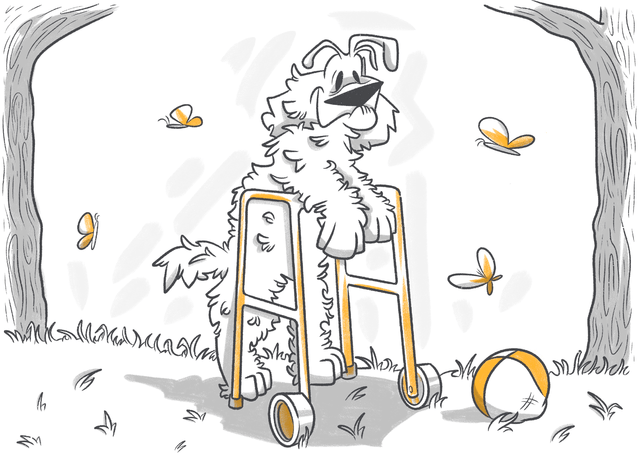If you’re considering getting pet insurance for an older pet, there are a few things you’ll need to know. Looking for cheap pet insurance for older pets will be more difficult than you may have thought, but there are still plenty of opportunities to get healthcare coverage for your furry family members.
Here’s what you really should know about pet insurance for older pets.
Stop Googling - Ask a Real Vet
Content:
- What Age is Considered a Senior Pet
- Is It Difficult to Get Insurance for a Senior Pet
- Why Your Old Pet Definitely Needs Insurance
- How to Get Insurance for Your Senior Pet
- FAQs
- Conclusion
What Age is Considered a Senior Pet
Cats and dogs are not the same when it comes to the senior stage of life. With dogs, size matters, and the same applies to rabbits and other domestic pets, too. There is no one-size-fits-all answer.
Here are a few of the most common pets in the United States, plus the age at which they reach the senior stage of life:
- Large dogs: 8 years
- Medium dogs: 10 years
- Small dogs: 11–12 years
- Cats: 11–14 years
- Small rabbits: 7-8 years
- Large rabbits: 4-5 years
- Horses: 15-20 years
- Budgies: 8–10+ years
Is It Difficult to Get Insurance for a Senior Pet
Yes, it is often more difficult to get insurance for a senior pet. It is possible to find the right policy with the right level of coverage for both you and your pet, though. You shouldn’t feel disheartened.
Senior pets are more likely to need medical care than their younger counterparts, so insurance premiums are higher or insurance isn’t readily available. It is more likely that senior pets will have at least one pre-existing condition, which many insurance providers don’t offer coverage.
Several insurance providers have an upper age limit. Trupanion, for example, does not offer pet insurance for pets over 14 years of age. Other providers have an upper age limit of 15. Thankfully, several alternatives can take the place of conventional pet insurance for very senior pets.
Why Your Old Pet Definitely Needs Insurance
It is without a doubt that your pet will need some sort of medical or health care as they enter their senior years, and this is more so if you have the pedigree or pure breeds.
According to NCBI studies french Bulldogs, for example, have flat faces (brachycephalic) and are almost 31 times more likely to suffer from brachycephalic obstructive airway syndrome, linked to small nostrils and a flat nose.
German Shepherd dogs are prone to blood disorders and epilepsy.
Labradors are at a higher risk of suffering from obesity, hyperthyroidism, bloating, and heart disease.
Chihuahuas have a higher risk of developing heart disease, problems with the liver, slipping kneecaps (also known as luxating patella), dental issues, and tracheal collapse.
And those are just a few examples!
Senior dogs are much more prone to developing all conditions, regardless of breed. Diabetes is commonly diagnosed in dogs aged 8 and older. Dogs aged 9 and above are more likely to develop dementia, cancer, and kidney disease.
In cats, common senior health problems include kidney disease, hyperthyroidism, and diabetes. Cats, dogs, rabbits, and several other pets are also more likely to suffer from arthritis as they enter their senior years. Rabbits are prone to developing cancer, respiratory tract infections, and dental disease as they enter their senior years.
How to Get Insurance for Your Senior Pet
Senior pets are the sole focus for some insurance companies, although senior-only providers are limited in number. A handful of companies offer insurance to pets of all ages, including senior pets.
It’s a good idea to look for breed-specific insurance providers, such as pet insurance for Bulldogs. These providers offer insurance plans that are specific to that breed’s common health complaints and medical problems.
There are also different types of senior insurance: accident-only coverage, illness and emergency cover, and maximum coverage. Accident-only coverage is not the best choice for senior pets with pre-existing conditions, but it can come in handy when you’re unable to find a suitable traditional insurance plan.
There are alternatives to conventional pet insurance, too. The Emergency Fund Service by Petcube offers up to $3,000 of emergency pet insurance coverage with no restrictions regarding age or medical history. It covers up to six pets, costs less than $1 per day, and comes with qualified vets available around the clock.
Other options you could consider for senior pet care costs include:
- Regular/monthly deposits into a high-interest savings account;
- Credit card;
- Loan;
- Low-cost pet clinics;
- Charitable grant;
- Vet networks;
- Crowdfunding;
- Community pools;
- Disabled or senior-specific medical organizations.
FAQs
Is senior pet insurance different from insurance for younger animals?
Yes, there are slight differences between insurance for seniors and young or adult pets. Senior insurance usually offers additional coverage for pre-existing conditions and age-related health problems. Insurance for younger pets usually excludes pre-existing conditions but sometimes includes vaccinations and other forms of preventative care.
Is pet insurance more expensive for older pets?
Senior pet insurance is usually more expensive because of the extensive coverage offered. More coverage and the inclusion of usually excluded conditions come with a higher price tag. It is a much better idea to start insurance with a company early and carry it on for life. Switching to a cheaper plan doesn’t always work out.
Conclusion
Insurance is another drain on your finances, but in the long run, you’ll save money. A lot of it! Emergency surgery for a pet could cost anywhere between $800 and $2,500, but a large portion (or all) will be reimbursed or paid for by your insurance provider.
It might not seem worth the cost right now, but one day you’ll be glad you purchased pet insurance.
Was this article helpful?
Help us make our articles even better









